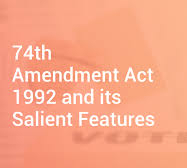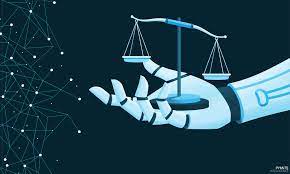Shad Khan, a Student of, School of Law, DAVV Indore has written this Article “What is 74th Amendment Act And It’s Impact on local bodies”
INTRODUCTION
Part IX-A was added to the Constitution by the Constitution (74th Amendment) Act, 1992. This amendment has added 18 new articles and a new Schedule-Twelfth Schedule relating to urban local bodies in the Constitution. Like Panchayati Raj Amendment, the 74th Amendment provides for constitutional sanction to the urban self-governing institutions ensuring regular elections and enabling them to play a greater role in the development of urban areas. This provides for three types of Municipal Corporations and reservation of seats in every Municipality for SC, ST, and women. The Amendment empowers the State Legislature to confer necessary powers and responsibilities upon the Municipalities in respect of the preparation of plants for economic development, the levy of taxes, and duties by municipalities.
What is the 74th Constitutional Amendment Act?
The 74th Amendment Act of 1992 provides a fundamental framework for the decentralization of rights and authorities to Municipal organizations at various levels. The State’s responsibility is to give it a specific form, nevertheless.
The 74th Amendment Act required the decentralization of powers and authority to Urban Local Bodies (ULB) at various levels. Also, this amendment made an effort to create an institutional framework that would provide access via independent municipal administrations in the country’s cities. The legislation aims to revitalize and improve urban governments so they can function effectively as local government organizations. The contents of this amendment are contained in Part IXA, which became effective on June 1, 1993. It thus gave local self-government organizations in urban regions a constitutional foundation. Additionally, it gave the ULBs the power to do the 18 responsibilities listed in the 12th Schedule of the Constitution.
What goals does the 74th Amendment Act seek to achieve?
The legislation intends to enhance and revitalize municipal governments so that they can effectively function as local government units. In accordance with the provisions of their respective constitutions, state governments must implement the new municipal system in accordance with the Act’s requirements.
The statute gave municipalities constitutional protection. They now fall under the protection of the Constitution’s justiciable provisions as a result.
Characteristics of the 74th Amendment Act,1992
The following were the primary changes made by the aforementioned Act:
Municipalities’ Constitution
According to the size and area of each state, the Act allows for the establishment of three different types of municipalities.
1. Nagar Panchayat (for an area in transition from rural to urban area);
2. Municipal Council for the smaller urban area; and
3. Municipal Corporation for larger urban areas.
Composition of Municipalities
Direct elections will be used to fill the seats. Each municipal region will be divided into territorial constituencies known as wards for this purpose. The state legislature may specify how a municipality’s chairperson is chosen, as well as the ways in which the following people are represented there.
- Those with specialized expertise and experience in municipal administration are not eligible to vote at municipal meetings.
- The members of the Lok Sabha and the state legislative assembly represent constituencies that contain entirely or partly the municipal area.
Reservation of seats
Every municipality allocates seats for SC and ST in accordance with its population.
Also, there is a provision for 1/3 of the seats to be reserved for women.
The state legislature has the authority to enact any reservation policies in favor of the underprivileged class at any level of the municipality.
Duration of Municipalities
Municipalities have five-year terms at every level of administration but can be dissolved before the term ends. If a dissolved municipality gets re-elected, it will complete the remaining period of its term as if it was never dissolved.
Disqualification of members
A person will be disqualified for the following reasons: if they violate any laws currently in effect for the state’s legislature elections; or if they violate any laws passed by the state legislature. However, no person shall be disqualified on the ground that he is less than 25 years of age if he has attained the age of 21 years.
Power and Function
The state legislature has granted the municipalities their responsibilities and authority.
The municipalities create a plan for the municipality’s residents’ social justice and economic development. It puts into action the plans created by the federal and state governments to improve the lives of the populace. Municipalities have the authority to improve job opportunities and carry out local development projects.
Finance
The state legislature may award grants-in-aid to the panchayats from the state’s consolidated fund and establish funds to credit all of the panchayats’ finances. The state legislature may also permit a panchayat to levy and collect taxes, duties, duties, and fees.
Finance Commission
The governor appoints the finance panel to assess the Municipalities’ financial standing.
The commission advises the governor on choosing the guidelines for how to split taxes between the state and municipalities. Moreover, it determines whether municipalities can be assessed taxes, levies, tolls, and other fees.
The state government has enacted laws requiring the towns to keep accounts and have those accounts audited.
Election Method
The State Election Commissions shall be in charge of supervising, directing, and controlling the preparation of electoral rolls. As well as for, and the conduct of, all elections to panchayats and municipalities.
Accountancy and audit
The municipal authorities shall carry out the maintenance of accounts and other audits in accordance with the provisions of State law. State legislatures will be free to make appropriate provisions in this regard, depending on local needs and the institutional framework available.
Municipal Revenue
There are five sources of income for the urban local bodies. These are as follows:
1. Tax Revenue
2. Non-Tax Revenue
3. Grants
4. Devolution
5. Loans
Division of Local government
1. Nagar Panchayat: A Nagar Panchayat is for those areas which are transitional areas i.e. transiting from Rural Areas to Urban areas.
2. Municipal Council: A Municipal council is for smaller urban areas.
3. Municipal Corporation: A municipal Corporation for Larger Urban Areas.
IMPACT ON LOCAL BODIES
Cities and towns have a significant impact on the country’s economic growth. These metropolitan areas significantly contribute to the growth of the rural hinterland. To keep this economic change in line with local needs and realities, we must involve people and their representatives fully in program planning and implementation. If democracy is to remain strong and stable in the Houses of Parliament and State Legislatures, its roots must extend into the towns, villages, and cities where people live. Any state may establish one of three types of municipalities under Article 243Q. The governor shall determine the three locations by public notice based on the population, the density of the population, money generated for local government, and the percentage of non-farm employment. Activities are related to agriculture and other elements.
Additionally, if a governor deems it appropriate based on industrial establishments, The governor may designate a city or township as an industrial township if an industrial facility is providing municipal services there. You cannot establish a municipality in such a situation.
What could possibly be the best book of the Constitution: https://sociallawstoday.com/best-book-for-the-constitution-of-india/
Frequently Asked Questions
What is the 74th Indian Constitutional Amendment?
A: The 74th Indian Constitutional Amendment, also known as the Nagarpalika Act, was enacted in 1992 to give constitutional status to urban local bodies (ULBs) and empower them with greater administrative and financial autonomy.
Q: What is the objective of the 74th Indian Constitutional Amendment?
A: The objective of the 74th Indian Constitutional Amendment is to empower local governments to ensure better governance and delivery of essential services to citizens at the grassroots level.
Q: What are the key provisions of the 74th Indian Constitutional Amendment?
A: The key provisions of the 74th Indian Constitutional Amendment include the establishment of three-tier local governance structures (Nagar Panchayats, Municipal Councils, and Municipal Corporations), the reservation of seats for women and disadvantaged groups, and the creation of State Finance Commissions to provide funds to local governments.
Q: How does the 74th Indian Constitutional Amendment ensure greater participation of citizens in local governance?
A: The 74th Indian Constitutional Amendment provides for the establishment of Ward Committees in urban areas to enable citizens to participate in local governance and decision-making processes.
Q: How does the 74th Indian Constitutional Amendment ensure financial autonomy for local governments?
A: The 74th Indian Constitutional Amendment mandates the creation of State Finance Commissions to ensure that local governments receive a share of state revenues, which they can use to fund their own development projects and services.
Q: What has been the impact of the 74th Indian Constitutional Amendment?
A: The 74th Indian Constitutional Amendment has led to the establishment of a more robust system of local governance in India, with greater participation of citizens in decision-making processes and more effective delivery of essential services at the grassroots level. However, challenges remain in terms of ensuring financial sustainability and capacity-building of local governments.
![]()




Leave feedback about this